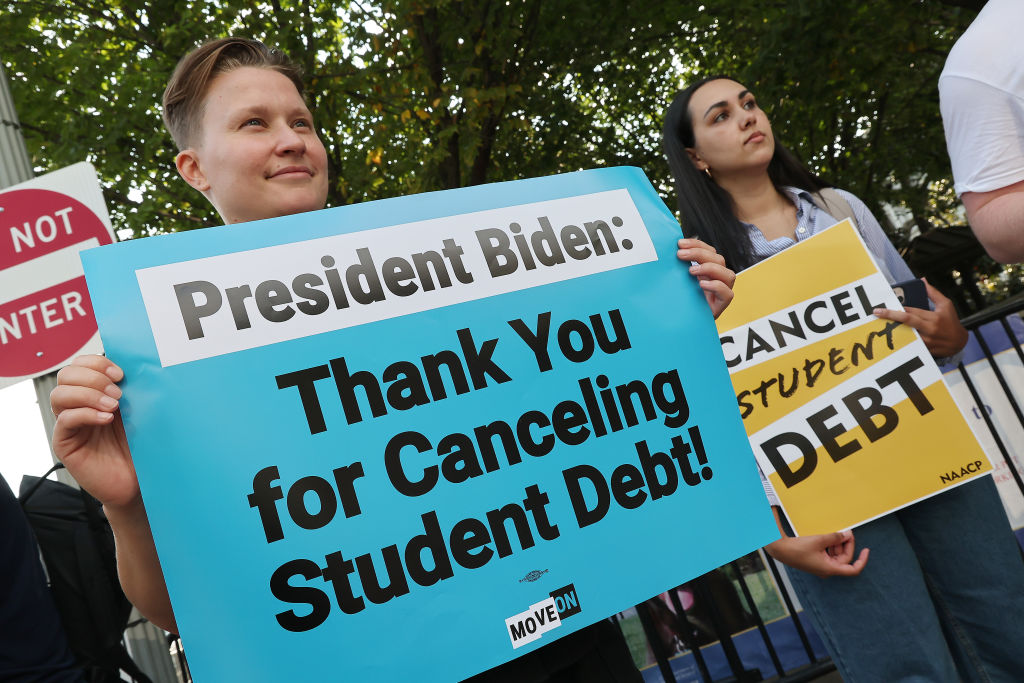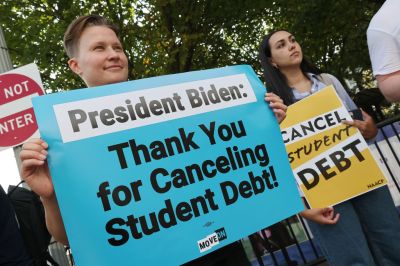President Joe Biden’s plan to unilaterally forgive hundreds of billions of dollars of student loan debt will get its day before the Supreme Court on Tuesday when attorneys make oral arguments.
The COVID-19 pandemic prompted Trump administration officials to issue a moratorium on federal student loans’ interest accrual repayments. But Biden’s move in August to cancel outright billions of dollars in debt—after initially extending the moratorium—pushed the bounds of executive authority to new levels. Biden’s plan would cancel up to $20,000 in federal student loans for as many as 26 million eligible borrowers (though most borrowers are expecting closer to $10,000 to be forgiven). The cost of his plan clocks in at an estimated $400 billion over 30 years, according to the nonpartisan Congressional Budget Office.
But lower courts blocked the move after legal challenges, and the administration stopped accepting new applications in November. The Supreme Court agreed to fast track the issue and will hear arguments from two lawsuits that challenge the plan.
Two cases, one issue.
In Biden v. Nebraska, six GOP-helmed states—Nebraska, Missouri, Arkansas, Iowa, Kansas, and South Carolina—argue the debt cancellation hampers collection of future tax revenue and harms a Missouri-based student loan company, the Missouri Higher Education Loan Authority (MOHELA.) MOHELA’s footprint is larger than just Missouri: As of fiscal year 2022, it serviced 5.2 million federal accounts, with the principal balances totaling $148 billion, according to the company’s financial statements from last year.
U.S. District Judge Henry Autrey originally dismissed the lawsuit in October, saying the states lacked the legal standing to sue, failed to show the loan forgiveness would directly harm them, and could not sue on behalf of MOHELA, the student loan company. (The company said in a letter to a U.S. lawmaker that it was not involved in the states’ decision to sue.)
But less than a month later, the 8th Circuit Court of Appeals granted the states’ appeal to hear the case, as well as an emergency injunction to stop the administration from implementing the plan, overruling the district court’s decision that the plaintiffs lacked standing.
MOHELA has a close relationship with Missouri: It was created by the state legislature, the governor appointed its board, and it is required by law to distribute $350 million to a state treasury fund for the program, the appellate court said. “MOHELA may well be an arm of the State of Missouri,” the panel of three judges wrote. “Due to MOHELA’s financial obligations to the state treasury, the challenged student loan debt cancellation presents a threatened financial harm to the State of Missouri.” Because at least one of the states had standing, the suit could continue, the judges ruled. (The other states had argued that they have standing because a provision in the American Rescue Plan Act prevents them from taxing discharged loans.)
When it agreed to take the case, the Supreme Court refused the Biden administration’s request to lift the emergency injunction.
In the second case on the issue, Department of Education v. Brown, two student-loan borrowers deemed ineligible for the full loan forgiveness argue the administration ran afoul of federal laws by skipping a notice and comment period before implementing the law (the problem that held the Obama and Trump administrations’ actions on Deferred Action for Childhood Arrivals, known as DACA). That left them unable to petition the administration to expand eligibility for the program during that process.
The high court hasn’t consolidated the cases, but it did allow the Biden administration to respond to both in one application to vacate the injunction.
Biden’s justification for the plan.
The Biden administration claimed its authority to forgive the loans rests on the 2003 Higher Education Relief Opportunities for Students (HEROES) Act, which Congress passed to alleviate the financial concerns of thousands of Americans who joined the military and deployed to the Middle East in the wake of the Sept. 11 attacks. The law grants the education secretary authority to “waive or modify” student loan balances in the event of “a war or other military operation or national emergency.”
The national emergency created by the COVID-19 pandemic justified use of the act because it impacted people’s ability to pay their loans, the administration argued.
Some legal experts, even those who disagree with the plan on the merits, note that the vagueness of the language in the HEROES Act may work to the Biden administration’s advantage.
“The Heroes Act is written in extremely broad terms. There’s a nonfrivolous argument that the Heroes Act allows this program,” American Enterprise Institute Senior Fellow Adam White told The Dispatch in December.
The Supreme Court has at times been skeptical of the administration’s use of the coronavirus pandemic to justify broad executive action, already batting down an eviction moratorium and a rule that employers implement vaccine or testing mandates. “The administration is once again invoking the Covid-19 pandemic to assert power far beyond anything Congress could have conceived,” lawyers for the states argued in a brief to the court.
They also are making the case that the Biden administration’s “reliance on the COVID-19 pandemic is a pretext to mask the President’s true goal of fulfilling his campaign promise to erase student-loan debt.” (Biden has said the move represents the fulfillment of a campaign promise.)
The national emergency is (almost) over.
A new legal wrinkle arose when the Biden administration on January 30 announced plans to end the COVID-19 public health emergency declaration on May 11. But it’s unclear how this will affect the ultimate outcome.
Nothing in the text of the HEROES Act requires the executive branch to tie its actions to ongoing declared emergencies, but the impending expiration is unlikely to bolster Biden’s case.
“I fully expect one or more justices to raise the question of how the administration can justify the program with the authority expiring,” said Amy Black, a political science professor at Wheaton College in Illinois. “The administration will almost assuredly make the case that pandemic effects affecting borrowers continue beyond the end of the declared emergency, but I expect many justices will be very hard to convince.”
The plaintiff states are also attacking the debt-relief program on grounds that it runs afoul of the “major questions” doctrine, which holds that administrative agencies cannot make decisions of “vast economic and political” import if Congress has not authorized such action. And so far, Congress has declined to address more broadly the question of student-loan relief.
The major questions doctrine was central to the Supreme Court’s 2022 decision striking down Obama-era Environmental Protection Agency regulations of coal and natural gas plant emissions. The court held that the agency’s Clean Power Plan exceeded its statutory authority.
“The size and scope of the action is staggering,” Black said of Biden’s plan. The estimated $400 billion over 30 years is “a lot of federal money to spend without consulting the legislative branch.”






Please note that we at The Dispatch hold ourselves, our work, and our commenters to a higher standard than other places on the internet. We welcome comments that foster genuine debate or discussion—including comments critical of us or our work—but responses that include ad hominem attacks on fellow Dispatch members or are intended to stoke fear and anger may be moderated.
With your membership, you only have the ability to comment on The Morning Dispatch articles. Consider upgrading to join the conversation everywhere.